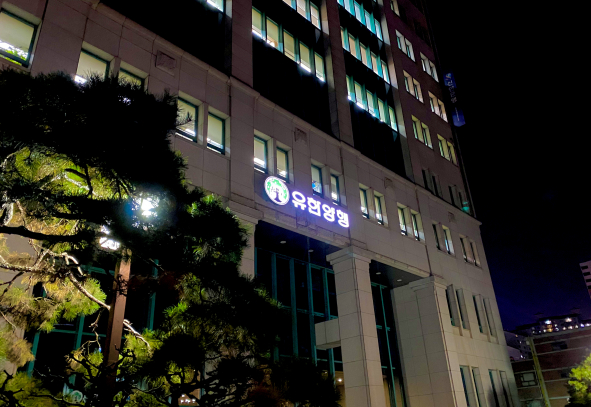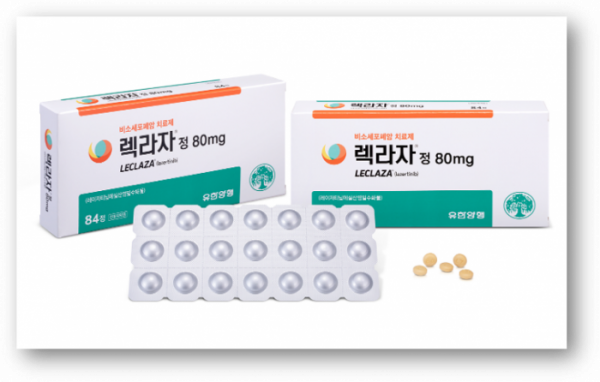기업
Yuhan wins approval as MFDS clear T790M EGFR TKI drug 'Lazertinib'
by Sungmin Kim
LECLAZA® demonstrated excellent central nervous system benefits in EGFRm+ NSCLC patients with brain-metastasis

Yuhan announced on January 18th, that the Ministry of Food and Drug Safety (MFDS) of Korea approved its epidermal growth factor receptor mutation-positive (EGFRm+) non-small cell lung cancer (NSCLC) therapy LECLAZA® (Brand name: lazertinib mesylate monohydrate, generic name: lazertinib mesylate monohydrate).
LECLAZA® is an oral, 3rd-generation tyrosine kinase inhibitor (TKI) that is highly mutant selective for EGFR mutations (Del19 and L858R) as well as T790M resistance mutations. Particularly, with a high blood-brain barrier (BBB) penetration profile, it has demonstrated excellent efficacy and tolerability in brain-metastasized lung cancer patients. This approval will provide treatment for locally advanced T790M mutation-positive or metastatic NSCLC patients with prior EGFR TKI therapy.
Lung cancer is the leading cause of cancer-related deaths as No. 1 mortality in Korea. Based on the histological classification, lung cancers are categorized into SCLC (small cell lung cancer) and NSCLC, with the latter accounting for 85% of the total lung cancer cases. Some patients with NSCLC are associated with EGFR mutations. EGFR mutations are commonly detected in NSCLC patients, accounting for 30~40% of NSCLC patients in Korea.
The national and international treatment guidelines for the treatment of NSCLC, recommend the use of the 1st to 3rd generation EGFR TKI as 1L treatment for EGFRm+ advanced or metastatic NSCLC. Still, most of the patients treated with 1st or 2nd generation targeted therapies acquire resistance to treatment, resulting in inevitable disease progression. The resistance due to T790M mutation accounts for 50 to 60%.
The approval is based on clinical data derived from patients receiving LECLAZA® as a second-line treatment in the clinical trial of LASER201 (YH25448-201) in EGFR mutation-positive advanced NSCLC patients. Across all dose levels in T790M+ patients (n=162), the objective response rate (ORR) by Independent Central Reviews (ICR) and investigator assessment (IA) were 59% and 68%, respectively. The PFS by ICR and IA for the T790M+ patients was 10.9 months and 11.0 months, respectively.
Among 78 patients who received 240mg of LECLAZA®, the ORR by ICR and IA were 58% and 72% in T790M+ patients (n=76). The median PFS by ICR and IA in the overall patients were 11.0 months and 13.2 months. Meanwhile, across all dose levels, the intracranial ORR of patients with measurable brain lesions was 55%(n=22) by ICR and 64% (n=22) by IA. The median intracranial PFS has not been reached for both ICR (n=64) and IA (n=89) (median follow up period 10.9 months). In LECLAZA® 240 mg treated group, the intracranial ORR of patients with measurable brain lesions was 71.4%(n=7) by ICR and 77.8% (n=9) by IA. The median intracranial PFS was 16.4 months by ICR (n=24) and has not been reached for IA (n=40).
Across all dose levels, the most commonly reported treatment-emergent adverse events (TEAEs) were rash (29%) and pruritus (28%), and constipation (22%) were mostly mild with Grade 1 or 2 in severity. Pneumonitis was reported in 1% (n=2) of patients, and one of them was reported as a serious adverse event. QTc interval prolongation occurred in 3% (n=6) of patients across all dose levels and 5% (n=4) of patients among the 240 mg treated group, but all the reported cases were mild with Grade in 1 severity. A clinically significant decrease in left ventricular ejection rate (more than 10%) was not observed.
Therefore, LECLAZA® demonstrated clinically meaningful efficacy and safety profile as 2nd Line treatment for EGFR T790M mutation-positive NSCLC.
Professor Myung-joo Ahn, Department of Hematology & Oncology at Samsung Medical Center, the first author of the clinical trial. "LECLAZA® is the first published Korean new drug in the authoritative Lancet oncology that its efficacy and safety have been recognized. Therefore, LECLAZA®'s approval is very meaningful, and the approval is expected to be a great treatment option for non-small cell lung cancer patients with positive EGFR T790M mutations," she said.
In addition, Professor, Byung-chul Cho, the head of the Center for Lung Cancer at Yonsei Cancer Center, who leads clinical trial of LECLAZA® and 1L of Phase 3 multi-national clinical trials, said, "The approval of LECLAZA® in Korea will bring a great impact on Korean society, and this will be a good treatment option in Korean lung cancer patients through clinically meaningful anti-tumor effects and safety." And he said, "Also, I expect that LECLAZA® will provide the hope to the world wide lung cancer patients through global clinical trials."
Jung-hee Lee, CEO of Yuhan Corporation, said, "LECLAZA® is a novel drug that has been developed in Korea as a result of Yuhan's strong footprint in new drug development capabilities - and unwavering dedication. LECLAZA® is a new drug that has been in the limelight with promising data from its development phase. I would like to express my heartfelt appreciation and respect for investigators who have made LECLAZA® and its approval possible. Based on this approval, I am delighted to be able to provide a new treatment option for patients with advanced EGFR T790M mutation-positive NSCLC.



















